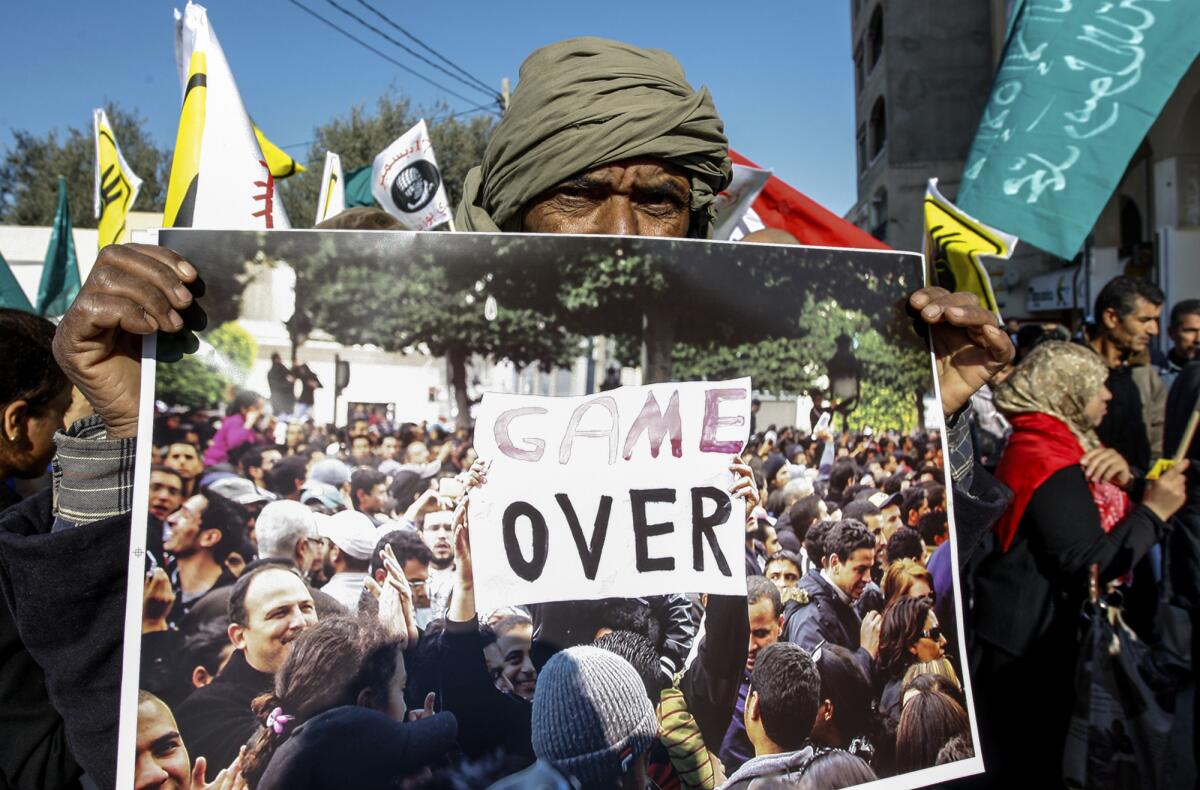Tunisians air discontent at rallies marking Arab Spring anniversary

- Share via
SIDI BOUZID, Tunisia — It was a humble man’s desperate act, but one with far-reaching consequences.
Relatively small and subdued crowds of Tunisians rallied Tuesday to mark the third anniversary of the self-immolation of vegetable seller Mohamed Bouazizi, which set in motion the series of uprisings across North Africa and the Middle East that came to be known as the Arab Spring.
While many hopes for democratization in the region have gone unrealized, some in this North African nation acknowledged a degree of positive change, even as they aired their discontents.
“We wanted to celebrate today in the best ways,” said Najmeddine Hamdouni, a 51-year-old farmer and activist in Bouazizi’s hometown of Sidi Bouzid. “I don’t want Tunisia to be Kabul. Tunisia has always believed in life and a civilized approach. We will succeed in making our country better.”
Bouazizi’s suicide was a cry against the lack of jobs and opportunity during the country’s years of stagnating under dictatorship. Tunisia’s employment rate remains a punishing 15% or more — up to 25% in Bouazizi’s hometown.
“Sidi Bouzid is still marginalized,” his mother, Manoubia, said sadly.
His 20-year-old sister, Samia, said the loss of her brother still haunts the family, and that their economic situation remains difficult. “Hopefully things will get better,” she said.
Despite hardships, the art of patient political negotiation has been on display in recent days in Tunisia. The ruling Islamist-led Nahda party, for months the target of popular protests, agreed over the weekend to the appointment of a caretaker prime minister to lead an interim government until elections can be held next year.
While the choice of Industry Minister Mehdi Jomaa as temporary prime minister is still a point of contention, the movement toward peaceful resolution of the political deadlock, in contrast to upheaval in regional neighbors like Egypt or the slide into chaos in next-door Libya, is seen by many as heartening.
For a time, it appeared Tunisia might follow a path of turmoil. This year saw two watershed political assassinations of liberal figures — Chokri Belaid in February and Mohammed Brahmi in July — that could have triggered violent upheaval. An October suicide bombing at a popular tourist beach resort, which killed only the bomber, generated a swell of unease.
The anniversary, too, could have been a perilous time. A banned militant group, Ansar al Sharia, called on supporters to take to the streets, prompting a heavy presence of security forces around government sites in the capital, Tunis. But marches mainly centered on commemoration of the day’s symbolic importance and unhappiness over the unemployment rate.
Twitter: @LauraKingLAT
Special correspondent Addala reported from Sidi Bouzid and staff writer King from Cairo.
More to Read
Sign up for Essential California
The most important California stories and recommendations in your inbox every morning.
You may occasionally receive promotional content from the Los Angeles Times.










